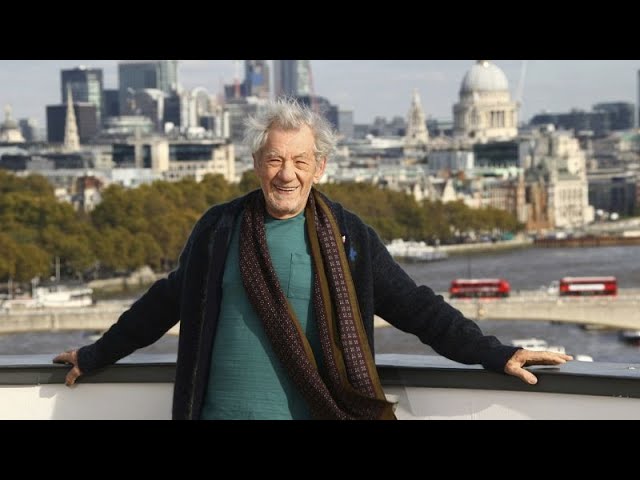Ian McKellen, 85, faces a challenging recovery after a serious fall during a west-end performance, leaving him hesitant to leave his home
Legendary actor Ian McKellen, known for his iconic roles in films like “The Lord of the Rings” and “X-Men,” is currently recovering at home after a severe accident during a live performance in London. On June 17, McKellen was portraying John Falstaff in a production at the Noel Coward Theatre when he lost his footing during a fight scene, causing him to fall headfirst into the audience.
The incident resulted in a chipped vertebra and a fractured wrist, forcing the 85-year-old actor to withdraw from the play. McKellen, who has dedicated decades to the stage and screen, now finds himself confined to his home, wary of going out due to concerns about further injury. Despite his injuries, he credits the fat suit he wore for the role of Falstaff with preventing even more serious harm.
In an interview, McKellen described the pain he continues to endure, particularly in his shoulders, and admitted that he often relives the fall in his mind. The psychological impact of the accident has been significant, leaving him anxious about being in public. “I don’t go out because I get nervous in case someone bangs into me,” McKellen shared, highlighting the fragility of his current state.
Despite these challenges, McKellen remains committed to his craft. He made a surprise appearance at a performance of “Player Kings” in Newcastle, supporting the cast even though he could no longer participate due to his injuries. His presence at the theatre was a testament to his enduring passion for acting and his determination to remain connected to the theater community.
Fans and colleagues have rallied around McKellen, offering their support and well-wishes as he navigates his recovery. The incident has also sparked conversations about the physical demands placed on older actors and the importance of safety measures in live theatre.
As McKellen continues his recovery, he has expressed hope for a full return to the stage. However, the accident has raised broader questions about the risks involved in live performances, particularly for ageing performers. McKellen’s experience serves as a poignant reminder of the vulnerabilities faced by even the most seasoned actors and the need for continued attention to safety in the theatre industry.
Analysis:
Political Perspective:
Ian McKellen’s accident shines a light on the broader issue of safety regulations in the performing arts industry. Politically, this incident could prompt discussions about the adequacy of current safety measures for actors, particularly those in physically demanding roles. There may be calls for enhanced protections and regulations to ensure the well-being of performers, especially older ones who may be more vulnerable to injury. The government and industry bodies might face pressure to implement stricter safety protocols, potentially leading to new legislation or guidelines that prioritize the health and safety of theatre professionals.
Social Perspective:
Socially, McKellen’s accident and subsequent confinement highlight the challenges faced by aging individuals in physically demanding professions. It underscores the importance of societal support systems for older adults, especially those who continue to work in high-risk environments. The incident also raises awareness about the need for mental health support for individuals dealing with the psychological aftermath of traumatic events. McKellen’s openness about his fear of leaving the house could contribute to a broader conversation about mental health and the importance of addressing anxiety and trauma in the aftermath of accidents.
Racial Perspective:
While the event does not directly relate to racial issues, it can be examined within the broader context of diversity and inclusion in the performing arts. McKellen’s status as an older white actor in a prominent role reflects the industry’s ongoing struggles with representation and diversity. The conversation about safety and support for aging actors could extend to discussions about how the industry supports performers from diverse racial backgrounds, particularly those who may face additional challenges or barriers in the industry.
Gender Perspective:
From a gender perspective, McKellen’s experience brings attention to the different challenges faced by male and female actors as they age. While McKellen’s injuries and subsequent fears are deeply personal, they also reflect the broader reality that male actors often continue to receive prominent roles well into their later years, while female actors frequently face age-related discrimination. This incident could spark discussions about the ways in which the industry treats aging actors of different genders and the need for more equitable opportunities and support systems.
Economic Perspective:
Economically, McKellen’s accident has implications for the theater industry, particularly in terms of production costs and insurance. The incident may lead to increased scrutiny of safety protocols, potentially resulting in higher costs for productions that must invest in better protective measures and insurance coverage for their actors. Additionally, the absence of a major star like McKellen from production can have significant financial repercussions, as ticket sales and audience interest may decline. This event could prompt theatre companies to reassess their financial planning and risk management strategies to mitigate the impact of such incidents.
